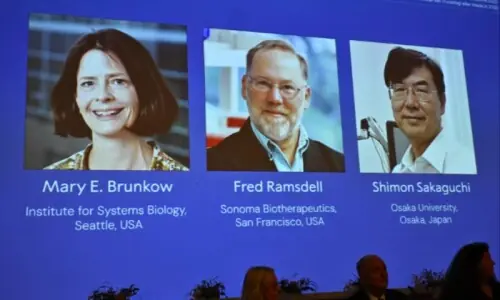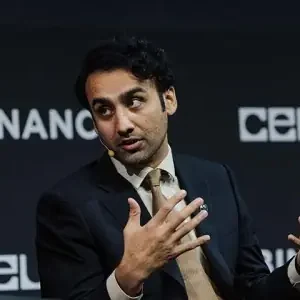On Monday, Japanese scientist Shimon Sakaguchi and American scientists Mary Brunkow and Fred Ransdell awarded the 2025 Nobel Prize in Physiology or Medicine for their research on how the immune system protects healthy cells, opening the door to potential new treatments for cancer and autoimmune diseases.
According to Marie Wahren-Herlenius, a professor of rheumatology at the Karolinska Institute, this year’s prize is related to peripheral immune tolerance, or “how we keep our immune system under control so we can fight all imaginable microbes and still avoid autoimmune disease”.
“I feel it is a tremendous honor”, Sakaguchi told reporters outside his university laboratory, according to Kyodo news agency.
Regulatory T cells: the “security guards” of the immune system
The Karolinska Institute medical university’s Nobel Assembly chooses the winners for the medical category. The winners get a gold medal from the Swedish king along with a prize of 11 million Swedish crowns ($1.2 million).
Ramsdell serves as a scientific adviser at Sonoma Biotherapeutics in San Francisco, while Brunkow is the senior program manager at the Institute for Systems Biology in Seattle. Sakaguchi teaches at the Japanese university of Osaka.
According to a statement from the organization that bestows the honor, “their discoveries have laid the foundation for a new field of research and spurred the development of new treatments, for example, for cancer and autoimmune diseases”.
According to the statement, the laureates discovered regulatory T cells, which serve as the immune system’s defenses against immune cells that target our own bodies.
Following the announcement of the winners, Thomas Perlmann of the institution stated that over 200 human trials utilizing regulatory T cells were still in progress, but that specific medicines had not yet received market clearance.
Ramsdell co-founded Sonoma Biotherapeutics, one of the early-stage companies in the race, which is partially financed and supported by US pharmaceutical company Regeneron to develop treatments for conditions like inflammatory bowel disease.
Quell Therapeutics has teamed up with AstraZeneca to address that issue as well. Bayer’s BlueRock is one of the several biotech companies investigating the strategy.
The first Nobel Prize in medicine
Alfred Nobel, the Swedish dynamite creator and successful businessman, left the Nobel Prizes in his will. With the exception of the World Wars, they have been given out since 1901 for exceptional contributions to literature, science, and peace.
The Riksbank, Sweden’s central bank, provides funding for the economics prize, which was added later.
Expert committees from different institutions choose the winners. With the possible exception of the Peace Prize, which is given in Oslo as a result of Sweden and Norway’s political union during Nobel’s lifetime, all prizes are given out in Stockholm.
Renowned scientists like Alexander Fleming, who shared the 1945 prize for developing penicillin, are among the previous winners of the Nobel Prize in Physiology or Medicine. Th award has honored significant discoveries in recent years, including as those that made it possible to create Covid-19 vaccinations.
US scientists Victor Ambros and Gary Ruvkon won last year’s medical prize for discovering microRNA and its crucial function in the growth and survival of multicellular creatures, which helps to explain how cells specialize into different types.
The yearly Nobles, which are perhaps the most prestigious awards in science, literature, peace, and economics, are traditionally given out in medicine first. The other winners will be revealed over the next several days.
The Nobel Prizes are still deeply rooted in tradition over a century after they were first awarded. The Swedish and Norwegian royal families attend the award ceremonies, which are followed by sumptuous banquets on December 10, Alfred Nobel’s death anniversary.
SOURCE: DAWN NEWS





